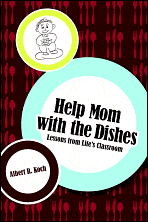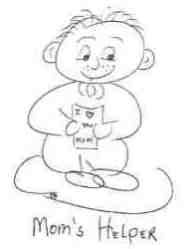From little on, my parent’s children were taught to work. There wasn’t any formal employment application or anything like that, one day you simply became aware of using a dust cloth, scrubbing floors, vacuuming rugs, scrubbing pots and pans, washing dishes, cooking, baking, assisting with laundry, and sanitizing the porcelain lifesaver in the family’s comfort station. On other occasions, we were introduced to the cleansing power of vinegar on dirty window glass, detergents for basement concrete and Johnson’s Paste Wax for furniture. As part of our domestic apprenticeship, we became intimately acquainted with products such as Fels Naptha, Climalene, Kitchen Klenzer, Lysol, American Family Flakes, Duz, Rinso, Lava and Linco Bleach. Our family never owned a car, but if we had there would have been a bumper sticker reading: “SEARCH FOR DIRT!”
By age ten we were quite skilled in the use of dish rags, dish towels, irons, ironing boards, washing machines, vacuum cleaners, rakes, reel push lawn mowers, brooms, mops, garden hoses, shovels, buckets, and garbage pails. Before the age of reason, I was instructed in the fine art of chicken feather removal. Standing on a crate in front of a laundry tub filled with hot water, plucking feathers from the latest candidate for our dinner table, one acquires a lasting impression from the perfume of soaking wet chicken feathers. By the time I was in sixth grade my work ethic was well honed. It happened unexpectedly a couple of years earlier—I used the wrong word talking to Mom.
It was my ninth birthday, January 21, 1950. It was a cold Saturday morning and I was complaining there was nothing to do. After all, one’s birthday should be filled with fun activities. I was in the midst of my personal pity party as I walked into the kitchen where Mom was doing some chores. “What’s your problem?” She asked. Before I considered my answer I blurted out: “I’m bored! There’s nothing to do!” “Bored, are you?” Mom replied, “I have something for you to do.” “This floor needs a good scrubbing. Get the pail, scrub rags, scrub brush and the Fels Naptha. You won’t be bored scrubbing the floor.”
There I was, birthday boy, on my hands and knees removing scuff marks and soil from the well-worn kitchen linoleum. I knew that this was just phase one of a two-room scrub. After the kitchen, there was the dining room, and after the dining room the back stairs to the basement would be wiped down completing Mom’s housekeeping triple play. This was not work for pay—it was service for service. Household chores were rewarded with clean clothes, meals, and comfortable accommodations. There was one good thing about all this. I never used the word bored again! Foolishly though, during my freshman year in high school, I tested Mom’s authority again. Elbow deep in Climaline detergent as I wiped up the basement’s cement floor I complained about what I believed to be excessive chores: “Mom, haven’t you heard, Lincoln freed the slaves!” Her reply was quick and needle sharp: “Maybe so, but Lincoln doesn’t live in this house, keep working!”
In order to earn spending money I did odd jobs. In winter, there were snow covered neighborhood porches and walks to clear; in summer, an abundance of weeds to pull and lawns to cut. This was truly a minimum wage affair. My highest pay, twenty-five cents weekly, came from cutting Mrs. Harmon’s lawn on the corner of 118th and Cleveland . Included with mowing was trimming the edges, sweeping off both front and back porches, sidewalk and driveway.
Then, in the summer of 1952, opportunity knocked and the job of paper boy arrived. Route 6B, Cleveland Avenue , from 119th street to the railroad tracks was available weekday afternoons: The Chicago Daily News, The Chicago Herald American and The Hammond Times needed delivery. I would also be responsible for collecting bi-weekly payments from the customers. Following a brief interview with “Dutch” Serafin and Mr. Chrustowski at The Whiting News Company, I was given a shoulder-strap canvas sack to carry papers and route book containing the names of customers and the paper ordered. The job paid $5.90 a week.
My tenure as paper boy lasted only until school began. I decided to become an independent contractor. Instead of delivering newspapers, I collected old ones. Scrap paper was worth a penny a pound and I would go door-to-door throughout neighborhoods asking for old newspapers and magazines. All through the autumn, winter and following spring I collected papers and tied them in 25 pound bundles. The forty-three dollar check from Hammond ’s Lake Iron & Metals Company more than paid for my glove and shoes from Neal Price’s in time for Little League Baseball season. I also bought a new baseball bat from Whiting News. The rest I saved for ancillary expenses.
In addition to work ethic training I learned how to organize, manage, plan, and accomplish goals. At home, I regularly demonstrated previously learned scrubbing, laundry, and housekeeping skills; and continued to “Help Mom with the Dishes.” To this day, I believe I was the only Whiting Little Leaguer with dish pan hands.
Saturday, April 4, 2009
Subscribe to:
Comments (Atom)
Where's Al going to be next???
Check back soon for his next appearance at a location near you!

